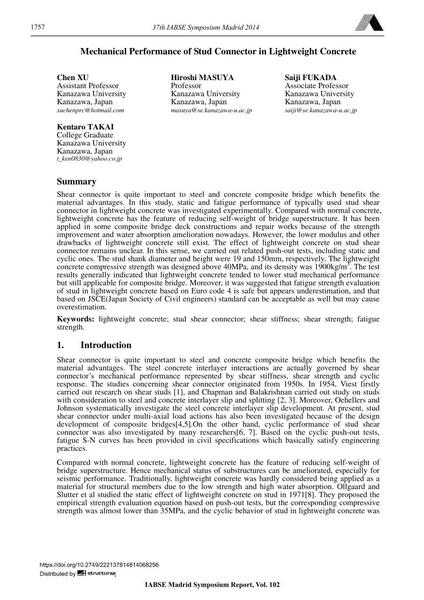Mechanical Performance of Stud Connector in Lightweight Concrete

|
|
|||||||||||
Bibliografische Angaben
| Autor(en): |
Chen Xu
Hiroshi Masuya Saiji Fukada Kentaro Takai |
||||
|---|---|---|---|---|---|
| Medium: | Tagungsbeitrag | ||||
| Sprache(n): | Englisch | ||||
| Tagung: | IABSE Symposium: Engineering for Progress, Nature and People, Madrid, Spain, 3-5 September 2014 | ||||
| Veröffentlicht in: | IABSE Symposium Madrid 2014 | ||||
|
|||||
| Seite(n): | 1757-1764 | ||||
| Anzahl der Seiten (im PDF): | 8 | ||||
| Jahr: | 2014 | ||||
| DOI: | 10.2749/222137814814068256 | ||||
| Abstrakt: |
Shear connector is quite important to steel and concrete composite bridge which benefits the material advantages. In this study, static and fatigue performance of typically used stud shear connector in lightweight concrete was investigated experimentally. Compared with normal concrete, lightweight concrete has the feature of reducing self-weight of bridge superstructure. It has been applied in some composite bridge deck constructions and repair works because of the strength improvement and water absorption amelioration nowadays. However, the lower modulus and other drawbacks of lightweight concrete still exist. The effect of lightweight concrete on stud shear connector remains unclear. In this sense, we carried out related push-out tests, including static and cyclic ones. The stud shank diameter and height were 19 and 150mm, respectively. The lightweight concrete compressive strength was designed above 40MPa, and its density was 1900kg/m³. The test results generally indicated that lightweight concrete tended to lower stud mechanical performance but still applicable for composite bridge. Moreover, it was suggested that fatigue strength evaluation of stud in lightweight concrete based on Euro code 4 is safe but appears underestimation, and that based on JSCE(Japan Society of Civil engineers) standard can be acceptable as well but may cause overestimation. |
||||
| Stichwörter: |
Scherfestigkeit Schubsteifigkeit
|
||||
